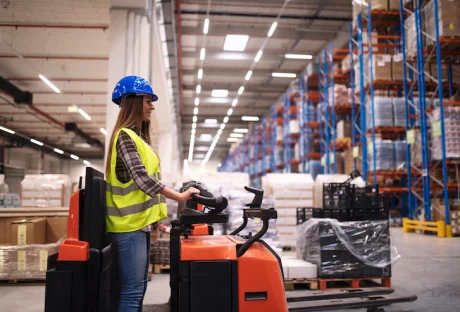Tag: types of forklifts

8 Tips to consider before shopping for a forklift
A forklift is an essential piece of equipment for warehouses, factories, and other businesses that need to move bulky or heavy items around. However, with so many different types of forklifts on the market — it's easy to get lost when looking for the best option. Read on important tips on what you should consider before purchasing best forklifts in Australia at Adaptalift. 1. Know what type of load you'll be lifting The first step in choosing a forklift is determining what type of load will be lifted most frequently. That's because each type of forklift has varying load capacities and different attachments that can affect how they lift items. For example, if you're handling loads that require movement in more than one direction, you might need a side loader or reach truck instead of the more traditional counterbalance lift truck. 2. Determine the Appropriate Forklift Class Forklifts fall into one of five classes: Class I, II, III, IV, and V. The class of a forklift refers to its lifting capacity. This is also known as the "load capacity" or "rated load." The class of a forklift ranges from 2,500 pounds to over 55,000 pounds. Each class has different features that are suitable for certain jobs. For this reason, it is important to understand your load requirements before purchasing a forklift. 3. Know Your Power Options There are many different power options when it comes to choosing a new or used forklift for your business. From electric-powered engines to combustion engines, there are several options that may fit your needs. Electric forklifts are best suited for indoor use because they don't produce exhaust fumes like internal combustion (IC) forklifts do. 4. Consider the Terrain There are many different types of forklifts on the market that can handle any terrain, including rough terrain and indoor/outdoor conditions. Choosing the right forklift depends on where you plan to use it. For example, small counterbalance models are typically used indoors in smaller spaces, while larger units with more power are best for outdoor activities and heavy lifting applications. 5. Know Your Capacity Requirements If your business uses heavyweights on a regular basis, you will have to choose a forklift with the strength and capacity to pick up those weights. If you only need to lift light weights, you aren't going to want to buy an industrial-size forklift. You should know the maximum weight you will be lifting so that you can pick the right lifting equipment for your business needs. 6. Consider the Terrain Not all forklifts are designed to handle bumpy terrain and poor weather conditions. Do you regularly lift things on uneven ground? Will your forklift have to navigate tough terrains such as mud puddles or sloping hills? Do you live in an area where snowstorms are common? If so, then you need a forklift that can handle these conditions without breaking down. 7. The forklift’s design and features If your forklift operators have limited experience, select a simple-to-operate forklift with a wide wheelbase, and high visibility controls. The more maneuverable the forklift is, the lower the risk of accidents. Preventive safety measures must always be in place to reduce the risk of damage to people and equipment. 8. Operating Environment This refers to the type of work environment that you have. Is it indoors or outdoors? Is it smooth or rough? Are there any special features that can make it difficult for operators to maneuver through? These are questions that you need to answer before selecting a forklift for your business needs. Many businesses operate in rough terrains such as construction sites or shipyards which require heavy-duty equipment like telehandlers or rough terrain forklifts; whereas indoor operations can benefit from electric-powered pallet jacks, for example. Weather conditions should also be taken into consideration when choosing a type of forklift. Read Also: What Industries Use Excavators?How Crane Trucks Can Drastically Improve Project Efficiency4 Common Mistakes To Avoid When Shipping Your CarLegal Ways to Determining Fault for an Arizona Truck Accident
READ MOREDetails















